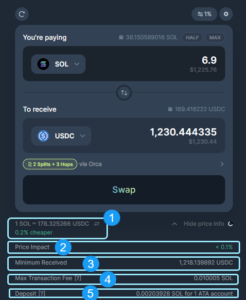Latest News
- PancakeSwap Ranks Third in Cryptocurrency Project Revenue
- Jupiter Mobile V2 Update to Feature Design Contest and DAO Voting
- Ozak AI, Litecoin, and Jupiter: Which Crypto Has the Strongest Potential for 500x Gains?
- Crypto Price Analysis 3-28: BITCOIN: BTC, ETHEREUM: ETH, SOLANA: SOL, RIPPLE: XRP, DOGECOIN: DOGE, BITTENSOR: TAO, JUPITER: JUP
Jupiter (JUP) presents a compelling case within the rapidly evolving blockchain ecosystem, distinguished by its innovative technology and robust decentralized framework.
The platform’s hybrid consensus mechanism not only enhances transaction speed and security but also opens avenues for diverse applications across various industries.
As we explore Jupiter’s unique features and market performance, it becomes evident that its potential extends far beyond mere speculation.
What remains to be examined is how these elements converge to shape its future in a competitive landscape. Let’s get into it!
Quick Overview
- Jupiter (JUP) utilizes a hybrid consensus mechanism, combining Proof of Stake and Delegated Proof of Stake for enhanced speed and security in transactions.
- The platform supports a robust smart contract functionality, enabling automated, trustless transactions and the development of complex decentralized applications (dApps).
- JUP token serves multiple purposes, including transaction fees, staking rewards, and participation in decentralized governance within the ecosystem.
- Cross-chain compatibility allows seamless asset and data transfers, enhancing interoperability with other blockchain networks.
- Active community engagement and partnerships foster continuous innovation, shaping the future direction of the Jupiter ecosystem.

Overview of Jupiter (JUP)
Jupiter (JUP) is a cryptocurrency designed to facilitate seamless transactions within its ecosystem, leveraging blockchain technology to enhance security and transparency. Developed to address the inefficiencies of traditional financial systems, Jupiter employs a decentralized ledger that allows for real-time transaction verification, reducing the need for intermediaries and minimizing transaction costs.
Its architecture is built on a proof-of-stake consensus mechanism, which not only enhances energy efficiency but also incentivizes users to participate in the network’s governance.
The JUP token serves multiple functions within the ecosystem, including transaction fees, staking rewards, and participation in decentralized governance. This multi-faceted utility guarantees active engagement from users and promotes a stable economic environment.
Additionally, Jupiter’s protocol is designed with scalability in mind, allowing for increased transaction throughput while maintaining low latency.
Security is a paramount concern for Jupiter, which employs advanced cryptographic techniques to safeguard user data and assets. The platform also undergoes regular audits by third-party security firms to identify and mitigate potential vulnerabilities.
Unique Features of Jupiter
The unique features of the Jupiter ecosystem distinguish it from other cryptocurrencies and enhance its utility for users. One of the standout characteristics is its hybrid consensus mechanism, which combines both Proof of Stake (PoS) and Delegated Proof of Stake (DPoS). This innovative approach not only enhances transaction speed but also increases network security by reducing the likelihood of centralization.
Additionally, Jupiter offers a robust smart contract platform that supports multiple programming languages, enabling developers to create decentralized applications (dApps) with ease. This flexibility fosters a diverse ecosystem of applications, ranging from finance to gaming, thereby attracting a wide range of users and developers.
Moreover, Jupiter implements a unique treasury system designed to fund ecosystem projects through community governance. This encourages active participation from stakeholders, ensuring that development aligns with user interests and market needs.
Another notable feature is its cross-chain compatibility, which allows assets and data to be transferred seamlessly across different blockchain networks. This interoperability enhances liquidity and broadens user engagement, positioning Jupiter as a versatile player in the cryptocurrency landscape.
Collectively, these features underpin Jupiter’s commitment to innovation, security, and user empowerment.
Market Performance Analysis
The market performance of Jupiter (JUP) is characterized by distinct price movement trends that reflect investor sentiment and market conditions.
Analyzing trading volume insights reveals fluctuations that may indicate shifts in liquidity and market interest.
Additionally, changes in market capitalization provide a broader perspective on the asset’s growth trajectory and overall market positioning.

Price Movement Trends
Market performance analysis reveals significant insights into the price movement trends of Jupiter (JUP), highlighting fluctuations influenced by broader economic factors and investor sentiment.
Over the past fiscal quarter, JUP has exhibited a volatile price trajectory, characterized by sharp peaks and troughs. The initial surge in value was attributed to positive market sentiment following strategic partnerships and technological advancements, leading to an increase of approximately 25% within a short period.
However, this upward momentum was subsequently challenged by macroeconomic headwinds, including inflationary pressures and regulatory uncertainties that tempered investor enthusiasm. A notable correction ensued, with JUP retracing nearly 15% from its peak as market participants reassessed their positions amid a shifting economic landscape.
Technical analysis indicates that JUP is currently maneuvering within a defined support and resistance range, with the 50-day moving average acting as a critical pivot point.
The Relative Strength Index (RSI) suggests that the asset is approaching oversold conditions, potentially indicating an impending rebound.
Additionally, ongoing developments in the cryptocurrency ecosystem will likely continue to play a pivotal role in shaping the price movement trends of Jupiter as it adapts to external market dynamics.
Trading Volume Insights
Recent trading volume data for Jupiter (JUP) reveals a complex interplay between market activity and investor behavior, underscoring the asset’s liquidity dynamics.
Analyzing the trading volume over the past several weeks indicates that fluctuations are influenced by both macroeconomic factors and specific market sentiment surrounding JUP.
During periods of heightened volatility, trading volume spikes, suggesting increased participation from both retail and institutional investors. This uptick often correlates with significant news events or technical indicators, indicating a reactive market environment.
Conversely, lower trading volume periods indicate a consolidation phase, where investor interest wanes, potentially leading to narrower price movements.
The average daily trading volume has shown a marginal increase, reflecting growing interest in JUP as a viable asset class.
However, it is essential to scrutinize the volume relative to price changes; a rising price accompanied by diminishing volume may signal a weakening bullish trend, while increasing volume on price declines could suggest panic selling.
Market Capitalization Changes
Fluctuations in trading volume have a direct correlation with changes in market capitalization for Jupiter (JUP), highlighting the asset’s responsiveness to market dynamics. An increase in trading volume typically signals heightened investor interest, often resulting in upward pressure on JUP’s market capitalization as demand rises. Conversely, decreased trading volume may indicate waning investor confidence, leading to potential declines in market capitalization.
Analyzing recent data, we observe that significant price movements have coincided with notable shifts in trading volume. For instance, during periods of increased volatility, JUP’s market capitalization exhibited substantial growth, reflecting the bullish sentiment among traders.
Conversely, during market corrections, JUP’s capitalization contracted, driven by a sell-off in response to external economic factors or negative sentiment.
The interplay between trading volume and market capitalization for JUP underscores the necessity for investors to monitor volume trends as a predictive tool for potential price movements. Additionally, external market conditions, regulatory changes, and technological advancements in the cryptocurrency ecosystem further influence these dynamics.
Continuous analysis of these factors is essential for understanding JUP’s market capitalization trajectory and making informed investment decisions.
Technology Behind Jupiter
The technology underpinning Jupiter (JUP) is anchored in a robust blockchain infrastructure that guarantees secure and efficient transactions.
This framework is complemented by smart contract functionality, enabling automated processes that enhance operational efficiency and transparency.
Together, these elements facilitate a decentralized ecosystem that supports the versatile applications of the Jupiter platform.
Blockchain Infrastructure Overview
A robust blockchain infrastructure underpins the functionality of Jupiter (JUP), facilitating its role as a decentralized finance solution. At its core, the platform leverages a high-performance blockchain architecture designed to support scalability, security, and interoperability. This foundation is essential for handling a growing volume of transactions while maintaining low latency, which is vital for real-time financial operations.
Jupiter employs a consensus mechanism optimized for energy efficiency and transaction throughput, ensuring that the network remains resilient under varying load conditions. By utilizing a combination of layer-1 and layer-2 solutions, it enhances its transaction processing capabilities, thereby accommodating complex financial applications without compromising the user experience.
Moreover, the modular architecture allows for seamless integration with other protocols and services, promoting an ecosystem that extends beyond its native functionalities. This interoperability is a significant factor that empowers users to engage with a broader range of decentralized applications and liquidity pools, thereby enhancing the utility of JUP tokens.
Smart Contract Functionality
Smart contracts serve as the backbone of Jupiter’s operational framework, enabling automated and trustless transactions within its ecosystem. These self-executing contracts, governed by predefined rules encoded on the blockchain, facilitate seamless interactions between users, applications, and decentralized services. The underlying technology guarantees that once the stipulated conditions are met, the contract autonomously executes without the need for intermediaries.
Jupiter employs a robust smart contract architecture, which is designed to enhance transparency and security. Each transaction is recorded immutably on the blockchain, thereby providing an auditable trail that enhances accountability. The use of decentralized consensus mechanisms guarantees that the integrity of the contracts is maintained, mitigating the risks of fraud and manipulation.
Moreover, Jupiter’s smart contracts are programmable, allowing developers to create complex financial products and services tailored to user needs. This programmability is vital for fostering innovation within the ecosystem, as it enables the integration of advanced functionalities such as conditional payments, automated compliance, and multi-signature transactions.

Use Cases and Applications
In various sectors, Jupiter (JUP) demonstrates its potential as a versatile blockchain solution, facilitating a range of use cases and applications. Its robust architecture and efficient smart contract capabilities make it a compelling choice for developers and businesses alike.
- Supply Chain Management: Jupiter enables real-time tracking of goods, ensuring transparency and authenticity across all stages of the supply chain, consequently minimizing fraud and inefficiencies.
- Financial Services: The platform supports decentralized finance (DeFi) applications, allowing for secure transactions, lending, and asset management without the need for intermediaries, thereby reducing costs and enhancing access.
- Identity Verification: Utilizing its blockchain technology, Jupiter facilitates secure and immutable identity verification processes, which can greatly improve KYC (Know Your Customer) compliance in various industries, including finance and healthcare.
- Gaming and NFTs: Jupiter’s infrastructure supports the development of decentralized gaming platforms and non-fungible tokens (NFTs), providing creators with new monetization avenues while ensuring ownership and provenance are easily verifiable.
These applications illustrate Jupiter’s adaptability and its capacity to drive innovation across multiple sectors, positioning it as a key player in the evolving blockchain landscape.
Community and Ecosystem
The strength of Jupiter (JUP) extends beyond its technical capabilities; it is also deeply rooted in a vibrant community and ecosystem that fosters collaboration and innovation. This community comprises developers, investors, and users who actively contribute to the platform’s growth and evolution. Engagement within this ecosystem is facilitated through various channels, including forums, social media platforms, and dedicated development hubs, where participants share insights, address challenges, and propose enhancements.
The collaborative nature of the Jupiter ecosystem is further enhanced by partnerships with other blockchain projects and industry stakeholders. These alliances enable knowledge exchange and the integration of complementary technologies, thereby strengthening the overall infrastructure. Additionally, the active participation of community members in governance mechanisms guarantees that diverse perspectives shape the direction of the project.
Moreover, the presence of educational resources and events, such as webinars and hackathons, promotes continuous learning and skill development among community members. This commitment to fostering expertise enhances the ecosystem’s resilience and adaptability in the rapidly evolving blockchain landscape.
Ultimately, the Jupiter community and ecosystem are pivotal to its success, driving innovation and guaranteeing that the platform remains relevant and competitive.
Investment Potential
Investment potential in Jupiter (JUP) is driven by a combination of its robust technological framework, growing user base, and strategic partnerships within the blockchain ecosystem. The platform’s architecture is designed to facilitate high transaction throughput and low latency, making it an attractive option for developers and users alike.
Additionally, the increasing adoption of decentralized finance (DeFi) applications enhances JUP’s relevance in the market.
Several key factors contribute to its investment potential:
- Technological Innovation: Jupiter’s continuous updates and enhancements improve performance and security, attracting more developers to build on its platform.
- User Acquisition: The expanding user base not only increases demand for JUP but also enhances liquidity, making it more appealing to investors.
- Partnerships: Strategic collaborations with established blockchain projects and financial institutions enhance Jupiter’s credibility and market reach.
- Market Positioning: As a player in the growing DeFi sector, Jupiter is well-positioned to capitalize on the shift towards decentralized financial solutions, which could lead to substantial growth in value over time.
These elements collectively underscore the investment potential of Jupiter (JUP) within the evolving blockchain landscape.
Future Outlook and Predictions
Analyzing the trajectory of Jupiter (JUP) reveals a promising future, bolstered by its strategic initiatives and market dynamics. The project has successfully positioned itself within the burgeoning decentralized finance (DeFi) landscape, leveraging innovative technologies to enhance user engagement and liquidity provision.
As the demand for decentralized solutions continues to surge, Jupiter’s proactive approach in establishing partnerships with key players in the blockchain ecosystem is a significant asset.
Market indicators suggest an optimistic outlook for JUP, especially as more investors seek exposure to digital assets that offer both utility and scalability. The team’s commitment to continuous development and community engagement further strengthens investor confidence, positioning Jupiter favorably against competitors.
In addition, advancements in regulatory clarity surrounding cryptocurrencies could catalyze broader adoption, providing a robust foundation for JUP’s growth trajectory.
Predictive analytics models indicate a potential appreciation in value, driven by increasing transactional volumes and user adoption rates. Additionally, ongoing enhancements to the platform’s infrastructure will likely improve operational efficiency and user experience.
Frequently Asked Questions
What Wallets Support Jupiter (Jup) for Storage?
Various cryptocurrency wallets support JUP for storage, including hardware wallets like Ledger and Trezor, as well as software wallets such as Trust Wallet and MetaMask. Ascertain compatibility and security features align with your storage requirements.
How Can I Buy Jupiter (Jup) Tokens?
To purchase tokens, investors can utilize cryptocurrency exchanges that list the asset. Typically, acquiring JUP involves creating an account, completing necessary identity verification, depositing funds, and executing a buy order for the desired quantity.
Is Jupiter (Jup) Listed on Major Exchanges?
Currently, Jupiter (JUP) is listed on several major cryptocurrency exchanges, facilitating trading and liquidity. Investors should verify specific platforms for availability, as listings can fluctuate based on market dynamics and exchange policies.
What Are the Transaction Fees for Jupiter (Jup)?
Transaction fees for cryptocurrencies can vary considerably based on the platform utilized, network congestion, and transaction type. It is essential to consult specific exchange policies or blockchain protocols to determine accurate fee structures for any cryptocurrency transactions.
How Can I Participate in the Jupiter Community?
To participate in the community, individuals can engage through official forums, social media channels, and community events. Active involvement in discussions, feedback sessions, and collaborative projects enhances connectivity and fosters a deeper understanding of the ecosystem.
Wrapping Up
In conclusion, Jupiter (JUP) presents a compelling proposition within the blockchain sector, characterized by its hybrid consensus mechanism and robust support for smart contracts.
The platform demonstrates versatility across various industries, including DeFi and gaming, underscoring its potential for significant real-world applications.
With strong community engagement and strategic partnerships, Jupiter is strategically positioned for future growth, suggesting a positive trajectory in the evolving cryptocurrency landscape.
Continued analysis will be essential to monitor its performance and developments.
